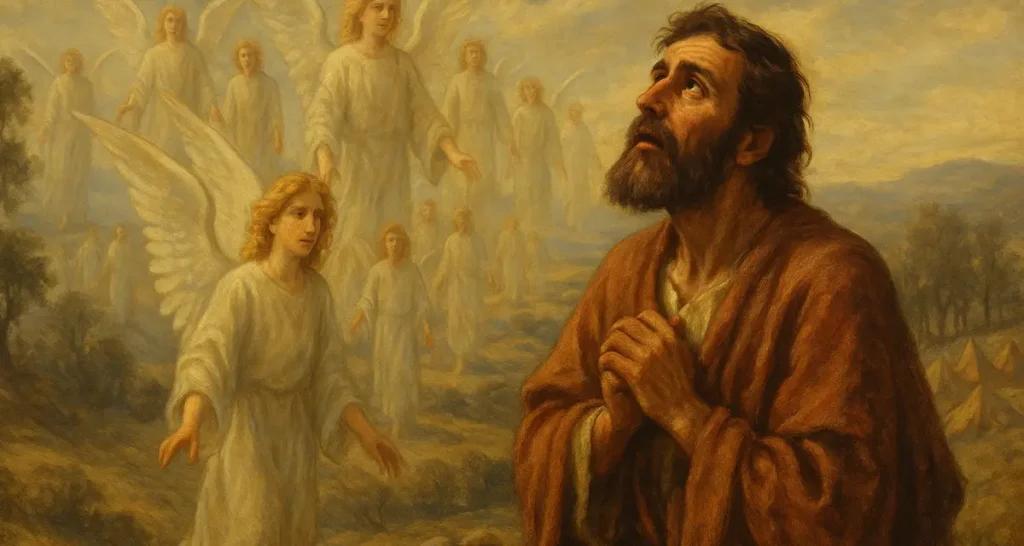This moment in Genesis 32:1–2 is deeply rich—emotionally, spiritually, and theologically. Let’s unpack it in light of Jacob’s journey and what it reveals about God’s dealings with His people.
📖 The Passage: Genesis 32:1–2
“Jacob also went on his way, and the angels of God met him. When Jacob saw them, he said, ‘This is God’s camp!’ So he named that place Mahanaim.”
🌄 Context: A Man in Crisis
Jacob is walking a tightrope of fear and uncertainty:
- He has just fled Laban, who once manipulated and deceived him.
- Now, he must face Esau, the brother he deceived 20 years ago, who had once vowed to kill him.
- He’s caught between two pasts—both filled with broken relationships.
In this emotional storm, God opens the invisible realm to him.
👼 “The Angels of God Met Him” — Echoes of Bethel
This is not the first time Jacob sees angels. Back in Genesis 28, at Bethel, he saw angels ascending and descending a ladder—a divine reassurance during his first exile.
But now, it happens again—at the return.
🔁 Two Angelic Encounters = Two Crises + Two Assurances
- At Bethel, when Jacob left in fear → Promise of God’s presence.
- At Mahanaim, when Jacob returns in fear → Confirmation that God never left.
This teaches us that God bookends our trials with His presence—even if we wander in between.
🏕️ Why “Mahanaim”?
Jacob calls the place “Mahanaim,” which means “Two Camps” or “Double Camp.”
There are different layers of meaning:
- Jacob’s camp and God’s camp — suggesting that Jacob is not alone.
- Earthly and heavenly realities — showing that God’s armies move alongside us, even when invisible.
- It foreshadows his strategic division of his own camp later in the chapter (Genesis 32:7), but here it’s not about strategy—it’s about assurance.
💡 What Does This Teach Us?
1. God Sends Assurance Before the Battle
Jacob is about to face his greatest fear—Esau. But before confrontation comes confirmation. God graciously shows that He has heavenly armies around Jacob, even if he still feels vulnerable.
🧠 Application: Before our greatest spiritual or emotional battles, God often sends reminders of His presence, whether through His Word, a person, or a moment of peace.
2. The Unseen is Real
Jacob sees angels—normally invisible. This reminds us that spiritual realities are not fiction; they are just hidden from ordinary view.
📖 “The angel of the LORD encamps around those who fear him, and he delivers them.” — Psalm 34:7
🧠 Application: In moments of crisis, we are often tempted to believe we are alone. This story reminds us of God’s invisible reinforcements.
3. We Walk with Fear—but Not Alone
Jacob is afraid. His fear doesn’t vanish, but God doesn’t abandon him because of it. In fact, God meets him in the fear, not after it.
🧠 Application: Faith isn’t the absence of fear—it’s walking with God through it, strengthened by His presence, not by our feelings.
4. God’s Faithfulness is Consistent, Even When We’re Not
Jacob has tricked, strived, and struggled. Yet God still sends angels. Why? Because the promise wasn’t based on Jacob’s performance—it was based on God’s covenant.
🧠 Application: God’s faithfulness doesn’t depend on how strong or good we feel—it depends on His nature. He finishes what He begins (Philippians 1:6).
❤️ Final Reflection
This passage isn’t just about a historical moment—it’s about every believer’s walk. We all have our Mahaniams—points in life where we feel stuck between the past and the unknown future. In those places, God shows us:
“You are not alone. My camp is with you.”
Let that be our courage—not just that we’re going somewhere, but that we’re going with Someone.


